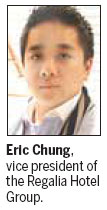
Since he was a child, Eric Chung loved to draw and could create design item elements that would help him become an architect.
It is this talent, the 31-year-old man said, that helped him on his path toward becoming an experienced architect and key figure in the expansion of Regalia luxury resort hotels in China, rather than the son of the founder and eventual heir of Regalia Hotel Group.
Amy Poon, founder and Chairman of Regalia, started the business in 1992 as a real estate developer and began developing serviced apartments in 2003. In 2007, the group began looking into the lucrative market of developing luxury resort hotels.
Eric Chung joined the company at that time as a project manager, responsible for the resort hotel built in Ligongdi in Suzhou of Jiangsu province.
"We started everything from scratch, the design, the construction to the opening, so it was a full hotel service that we did for the company," said Chung.

After obtaining a bachelor's degree in both architecture and design in Melbourne University in Australia, Chung started his career in the largest architecture firm in Hong Kong, the DLN architecture associates, focusing on projects of Shangri-La hotel group.
When he was in Australia, Chung chose to work in a small boutique architecture firm. As the only Asian person and the youngest project manager of the firm, he managed about 60 different resorts projects during a three-year period, varying from retirement villages to resort villages around Australia.
With Chung's experience and the fame of Regalia as an upscale service operator in Suzhou, the Ligongdi resort hotel proved to be a hit in boutique hotel industry in China. Three other resort hotels have been successfully built in Tangshan and Qinhuai River in Nanjing, and Deqin of Yunnan province.
Revenue of these resort hotels increases about 30 percent every year, said Chung. The company plans to build 20 more hotels in the next three to four years, and 12 of them have been confirmed in cities like Xi'an, Qingdao, Dalian and Chengdu.
In designing each hotel, Chung tried to incorporate the Southeastern style with local culture. "For the interior design in Suzhou property, we upgraded the use of space, creating a lot of intimate corners for people to explore and experience, because we are resorts and we have to be personalized for the guests."
Target consumers of Regalia's resort hotels, from Chung's view, are the fast-growing group of people who are "well-paid, successful, travel a lot and have a good taste in lifestyle".
The company's sales strategy is to target these elite few and to serve them in every way. The Regalia resort hotels usually have about 50 rooms. They have three staff per guest and a 5-star hotel is about 1.8 to 1.5 staff per guest, said Chung. "In a sense, Regalia is a family business that our founder would love to keep the business in the same blood. But I believe it is all about capability, to let the most capable to take the top position, because today we have more than 500 staff, we have to run the company in a corporate manner and in a socially responsible way," he said.